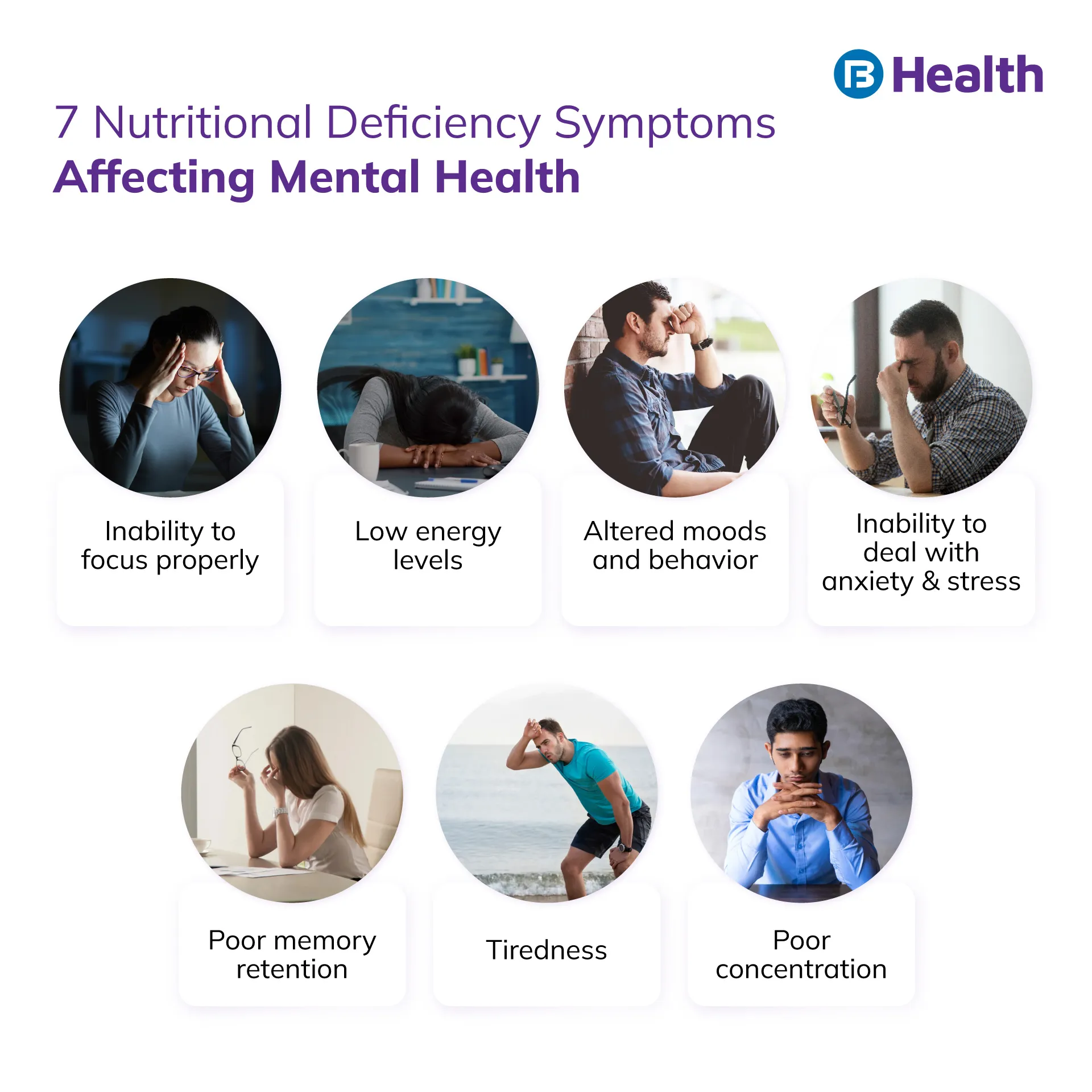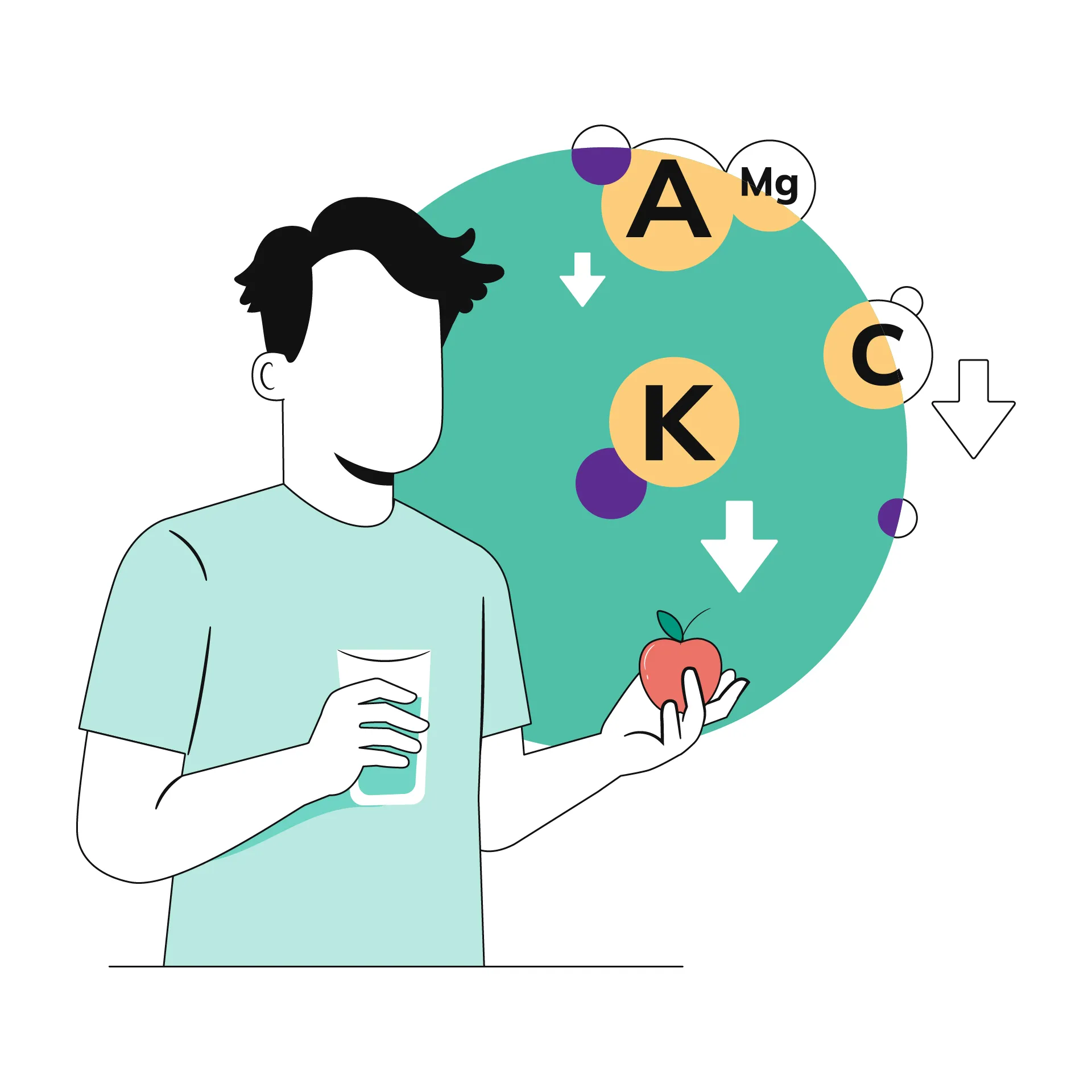Psychiatrist | 5 min read
Nutritional Deficiency: 5 Nutrients for Good Mental Health
Medically reviewed by
Table of Content
Synopsis
Inadequate nutrients result in nutritional deficiency, affecting mental health. Nutritional deficiency symptoms like mood swings can cause nutritional deficiency disorders. Zinc and iron can help!
Key Takeaways
- Nutritional deficiency of minerals and vitamins can affect your mental health
- Depression, mood swings and schizophrenia are nutritional deficiency disorders
- Nutritional deficiency symptoms include fatigue and poor memory retention
While you may be aware that nutritional deficiency can affect your physical well-being, it is important to know that deficiency of nutrients in your meals can harm your mental health too. If you experience mood swings, you may tend to blame it on environmental, psychological, or biological factors. But it is important for you to realize that nutritional deficiency could also be the reason. Mental health plays a vital role in your well-being. If not addressed properly, it can cause depression or anxiety attacks.
Did you know that approximately 5% of adults experience depression on a global scale? Being a common mental illness, around 280 million people suffer from depression. According to WHO, it is vital to prioritize mental health and educate people on its importance [1]. With this goal in mind, World Mental Health Day is observed every year on October 10. This day helps increase awareness of mental health issues so you or your loved ones can get timely treatment [2].
Now that you know the importance of mental health, it is necessary for you to know if a nutritional deficiency is the underlying cause of depression, mood swings, or anxiety. Nutritional deficiency disorders can affect your brain functioning, thereby increasing mood swings, despair, or irritability. So, it is important to ensure that your daily meals contain all the nutrients essential for physical and mental well-being. Remember to include the following vital nutrients in your diet to boost your mental health and prevent nutritional deficiency disorders.
Additional read: What is Vitamin B12 Deficiency1. Reduce Stress By Magnesium
Magnesium is a valuable mineral for the body that helps reduce stress hormones. It is an excellent mineral for relaxation. If your diet lacks this mineral, you may be prone to different mental ailments like:
- Insomnia
- Confusion
- Irritable nature
- Hallucinations
- Anxiety

Good sleep also eliminates stress. In fact, sleep and mental health are interlinked. Irregular sleep patterns can increase anxiety and mood disorders. So, it is vital to eat foods rich in magnesium to beat stress and avoid nutritional deficiency. A few foods containing magnesium include:
- Almonds
- Peanuts
- Avocado
- Green leafy vegetables
- Beans
- Pumpkin seeds
2. Maintain Hormonal Balance By Vitamin D
Vitamin D helps in the production of neurotransmitters like dopamine and adrenaline. You may experience nutritional deficiency symptoms such as mood swings, fatigue, and irregular sleep patterns if your body does not get adequate vitamin D. While this vitamin is always linked to bone health, eating foods rich in vitamin D can boost your mental health too.
Known to be a mood regulator, nutritional deficiency of vitamin D can increase your stress and anxiety attacks. Combat your nutritional deficiency symptoms by eating these foods rich in vitamin D.
- Eggs
- Fortified milk
- Fatty fish
- Mushrooms
Soak yourself in sunlight to maintain a balance of vitamin D in your body as it is the best source of vitamin D!
3. Boost Memory With Omega-3 Fatty Acids
For proper functioning of the brain, your body requires sufficient amounts of omega-3 fatty acids. They help your cells to work efficiently and increase the functioning of neurotransmitters. A few nutritional deficiency symptoms due to a lack of omega-3 fatty acids include:
- Low memory retention
- Fatigue
- Dryness of the skin
Including these fatty acids in your diet can help you combat inflammation. This can reduce mental disorders like depression or mood swings that occur due to nutritional deficiency. Known to enhance your mood and memory, do not miss taking these nutrients either through foods or supplements. Here are a few foods rich in omega-3 fatty acids.
- Tuna
- Salmon
- Cod liver oil
- Walnuts
- Flaxseeds
4. Improve Concentration By Foods Rich In Iron
This mineral plays a vital role in producing red blood cells. If your meals lack iron, it can affect your cognitive skills like concentration, attention span, and intelligence. Nutritional deficiency of iron can cause irritability, stress, or even depression [3].
Other nutritional deficiency symptoms due to lack of iron include:
- Headaches
- Low energy levels
- Tiredness
- Anxiety
While iron is linked to anemia, it promotes mental well-being too. Make sure to include these foods rich in iron in your meals.
- Fish
- Pulses
- Beans
- Eggs
- Spinach
- Whole grains

5. Regulate Brain Functioning With Zinc
This is another vital mineral that plays a major role in regulating your stress levels. You’ll be amazed to learn that your brain contains maximum reserves of zinc. So, it is important for the healthy functioning of your brain. Not only does zinc activate your peripheral and central nervous system, but it also aids in many hormonal and neurotransmitter processes.
If your meals do not contain adequate amounts of zinc, it may cause nutritional deficiency disorders like schizophrenia and anxiety attacks. Nutritional deficiency of zinc may also result in depression and difficulties in learning and understanding new subjects. Make sure to keep track of your zinc intake by eating foods rich in zinc.
- Pumpkin seeds
- Whole grains
- Dark chocolate
- Poultry
- Spinach
- Raisins
- Seafood
Now that you know how nutritional deficiency can impact your mental health remember to include these critical nutrients in your diet. After all, a healthy mind is a key to a happy and active life. All these nutritional deficiency disorders can affect both your physical and mental health. So, it is important to check your nutrient levels regularly and eat a wholesome, nutritious diet.
If you are experiencing any mental health issues, do connect to experienced psychologists and nutritionists on Bajaj Finserv Health. Get a doctor's consultation and address all your mental health problems along with nutritional deficiency symptoms. Take proper care of your mental health and lead a happy life!
References
- https://www.who.int/health-topics/mental-health#tab=tab_1
- https://www.who.int/campaigns/world-mental-health-day
- https://www.ncbi.nlm.nih.gov/pmc/articles/PMC2738337/
Disclaimer
Please note that this article is solely meant for informational purposes and Bajaj Finserv Health Limited (“BFHL”) does not shoulder any responsibility of the views/advice/information expressed/given by the writer/reviewer/originator. This article should not be considered as a substitute for any medical advice, diagnosis or treatment. Always consult with your trusted physician/qualified healthcare professional to evaluate your medical condition. The above article has been reviewed by a qualified doctor and BFHL is not responsible for any damages for any information or services provided by any third party.



